Cashing in: the benefits of a cashless society
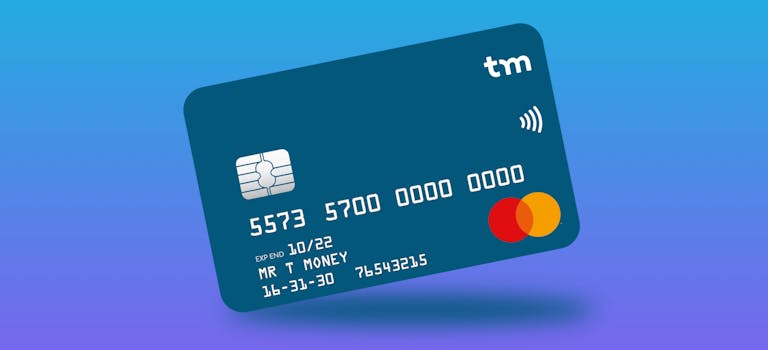
Updated on 13/05/2020 - Stats refer to the original date the blog was published
Britain is heading towards a cashless future. Over 98% of UK adults now have a debit card, and by 2027, 58% of all payments will be made by card.
During Covid-19, there has been a drastic decline in ATM usage as people either spend less, or avoid hard cash. Some experts think, with this decline, along with the increase in the amount you can spend on contactless payments to £45, there could be a long-lasting shift towards card only transactions.
But what would happen if we were to become a cashless Britain? We’ve uncovered the potential benefits of ditching cash in the UK.
Seven benefits of a cashless Britain
1. Lower risk of illness due to ‘dirty cash’
There’s no denying cash is packed full of bacteria. In fact, the Dirty Money Project found that banknotes can contain up to 3,000 different types of bacteria. The notes could even spread pathogens that cause skin infections, food poisoning and stomach ulcers. Consequently, during Covid-19, it has been advised to ditch the cash as it could spread the virus.
Swapping physical money for card payments could lead to serious improvements for our health - particularly as it’s estimated that a £20 note will be exchanged 2,328 times in its 113 month lifespan. And according to Michigan State University, only 5% of people wash their hands after using the toilet.
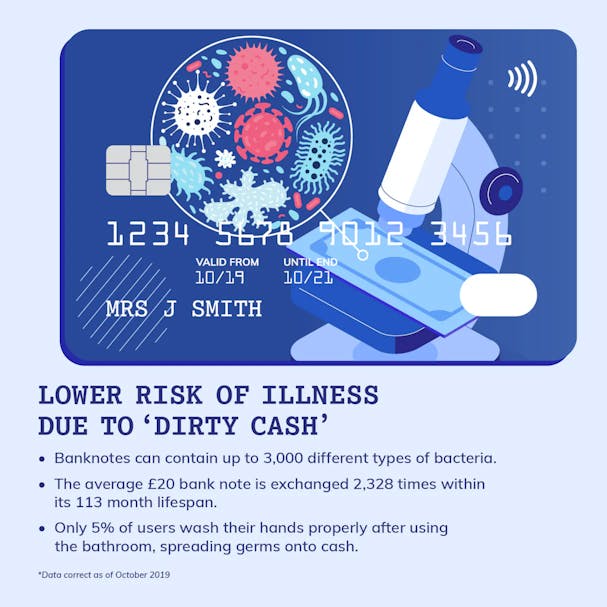
2. Money is safer with banks
A US study reported a 9.8% reduction in cash-based crime when electronic benefit payments were introduced in the mid-1990s. The report by the US National Bureau of Economic Research claimed that most street crime is motivated by cash, and with less cash on the street, fewer crimes were committed.
Your money is safer in the bank. In the past year, UK banks have successfully prevented £1.66 billion in fraud. The finance industry hopes to improve security and prevent more fraud through new Strong Customer Authentication regulations introduced in September 2019.
Strong Customer Authentication means you’ll have to provide two or more pieces of information to prove that it’s you making a transaction. Common examples of Strong Customer Authentication are receiving a one-time passcode or a request to log in to the app to verify an online purchase.
Though remember to keep one-time passcodes secret. Banks, the police and other reputable organisations will never call you to ask for one-time passcodes – you’d only ever enter them on a webpage or app.
3. Better budgeting for Brits
According to Access to Cash, 9 in 10 Brits believe that using their cards instead of cash helps them track their overall spending and stay within their budget. Card transactions appear on banking apps and statements, which gives people greater visibility of their finances. Some current accounts, like thinkmoney, can even help customers to pay their bills on time, by keeping money aside for them. In some cases, users can receive up to the minute statements and the ability to also freeze and unfreeze cards.
4. £23,145 boost in profits for the average business
As consumers turn towards card and digital payments, businesses need to follow suit - especially if they want to see an increase in sales and profits.
Worldpay estimated that SMEs lose £23,145 annually by only accepting cash. Should businesses choose to accept only card payments, they could see an increase in revenue. Likewise, only accepting cards means less time spent cashing up and going to the bank, freeing up time to serve customers.
5. Increases in charity donations
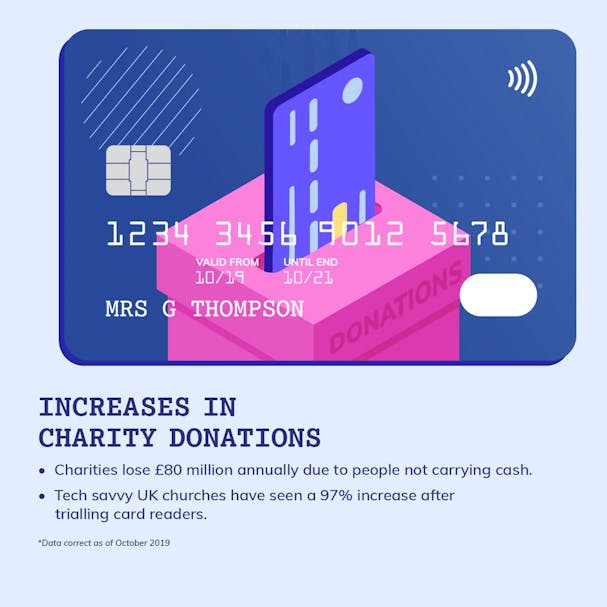
How many times have you said: “No, sorry, I don’t have any change” to charity vendors in the street?
It has recently been estimated that UK charities lose a staggering £80 million each year due to people not carrying cash. Subsequently, this has led to the likes of Big Issue trialling card readers for their vendors in an effort to increase donations.
Situation Sweden, a charity based within the country, has started to trial card readers to increase donations. Similarly, tech savvy churches within the UK have begun offering contactless options for donations, with some seeing a staggering 97% increase in donations.
Daniel Booth, Head of Communications and Fundraising at Emmaus, also said they had noted an “increase in digital donations over the past four to five years” As such, all shops now boast card facilities and, over the next 10 years, they are looking to diversify their fundraising income to pave the way for more online donations.
6. Safer staff in retail and food outlets
According to the Home Office, crime against wholesale and retail businesses has fallen since 2012. In 2012, 53% of premises had experienced crime, falling to 44% within five years, which could be attributed to a decrease in the number of establishments handling cash.
Likewise, Bohopubco - owners of The Borough, The Lodge and The Britannia in Manchester - trialled going cashless for five months for similar reasons. Previously, the restaurants had been broken into and, each time, the burglars were looking for cash kept in the premises.
Dan Knowles, Marketing Director at Bohopubco, said that going cashless had helped to “ensure the safety of his staff while even improving customer service.''
7. The UK Government could save £35bn - Enough to pay NHS nurse and GP wages
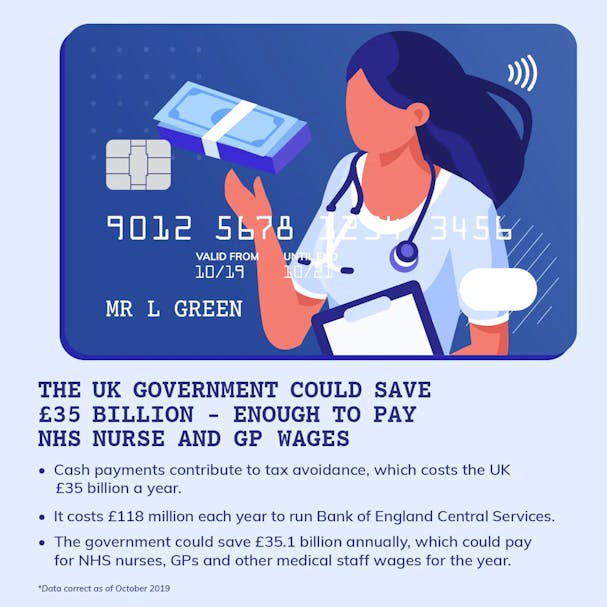
Did you know that HMRC has estimated they have lost a staggering £35 billion annually to tax avoidance since figures were first published in 2008? If we were to move our money solely online, this figure could be reduced due to the ability to track money from start to finish.
In addition, it costs £188 million each year to run the Bank of England Central Services – responsible for issuing currency and overseeing the country’s monetary policy.
If the UK were to go cashless, the government could potentially save an eye-watering £35.1 billion yearly; which could pay the current wages of NHS nurses, GPs and other medical staff for one year. Alternatively, this could cover the costs of the police budget for three years!
83% of the UK’s population is ready to go cashless
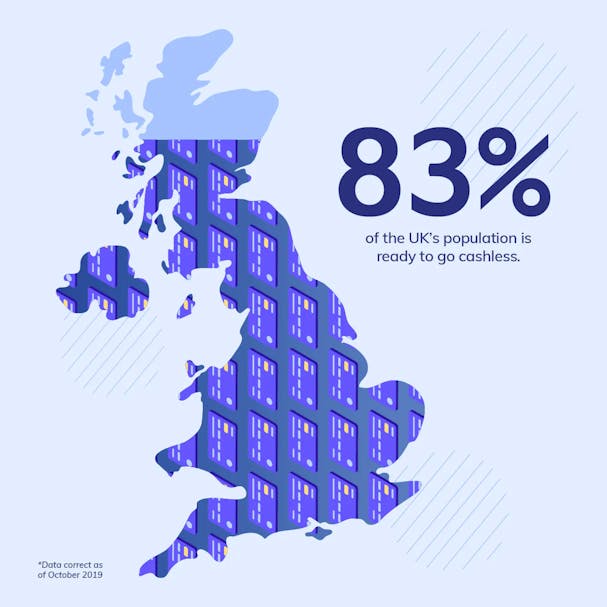
The latest Access to Cash report found that 83% of the UK’s population would cope if the UK were to become a cashless society. This could be due to the continued trend of online payments and using our phones for day-to-day financial tasks.
In line with the above figures, there has also been a notable drop in the number of people using cash machines - suggesting we are preparing for the ‘death of cash’.
London is best prepared for a cashless society
The UK’s capital has recorded an 8.5% decrease in people using cash machines in the past year, with more people turning to their cards and digital payments. Southern regions appear to be better prepared than Northern regions, with the South East and the South West noting similar drops, at 7.7% and 7% respectively.
Cash withdrawals in Northern Ireland only reduced by 2% between 2017 and 2018, suggesting people living there are likely to struggle in a cashless Britain. This could be because Northern Ireland contains many rural communities, who are said to be at worst affected if we stop using cash.
Notably, Northern Ireland is the only region in the UK that saw an increase in the number of bank branches between 2012 and 2018, with 8% more in the past six years. All other regions have noted a decrease in bank branch openings, with the largest drop of 21% in the South West.
Every year, we use cash less and less. We are already on our way to a cashless society, with many benefits for both businesses and consumers. We might soon see the UK following Sweden’s suit, who have pledged to go cashless by 2023.
< Back to articles
